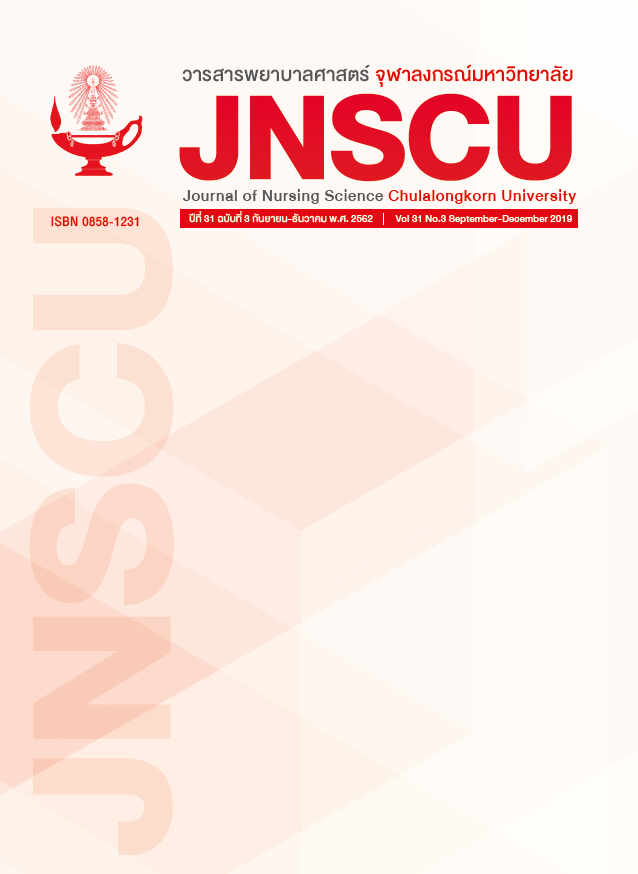ปัจจัยคัดสรรที่สัมพันธ์กับการทำหน้าที่ด้านร่างกายของผู้สูงอายุโรคหลอดเลือดสมอง
คำสำคัญ:
โรคหลอดเลือดสมอง การทำหน้าที่ด้านร่างกาย, ผู้สูงอายุบทคัดย่อ
วัตถุประสงค์: 1) เพื่อศึกษาการทำหน้าที่ด้านร่างกายของผู้สูงอายุโรคหลอดเลือดสมอง 2) เพื่อศึกษาความสัมพันธ์ระหว่าง เพศ อายุ ภาวะซึมเศร้า การสนับสนุนทางสังคม และการรู้คิด กับการทำหน้าที่ด้านร่างกายของผู้สูงอายุโรคหลอดเลือดสมอง
รูปแบบการวิจัย: การวิจัยเชิงบรรยายเชิงวิเคราะห์ความสัมพันธ์
วิธีดำเนินการวิจัย: กลุ่มตัวอย่าง คือ ผู้ที่มีอายุเกิน 60 ปีบริบูรณ์ขึ้นไป ทั้งเพศหญิงและเพศชายโรคหลอดเลือดสมอง ที่มารับบริการในแผนกผู้ป่วยนอกโรงพยาบาลระดับตติยะภูมิ 2 แห่ง จำนวน 121 คน คัดเลือกกลุ่มตัวอย่างด้วยวิธีการสุ่มกลุ่มตัวอย่างแบบเจาะจงตามเกณฑ์คัดเข้า เก็บข้อมูลโดยใช้การตอบแบบสอบถาม เครื่องมือที่ใช้ในการวิจัย ได้แก่ แบบสอบถามข้อมูลส่วนบุคคล แบบสอบถามการสนับสนุนทางสังคม แบบประเมินภาวะซึมเศร้าในผู้สูงอายุไทย แบบประเมินการรู้คิดโดยใช้ MMSE-Thai 2002 และแบบประเมินการทำหน้าที่ด้านร่างกาย โดยใช้ Barthel ADL Index ซึ่งมีค่าความตรงตามเนื้อหา เท่ากับ .92 มีค่าความเที่ยง เท่ากับ .71, .80, .83 และ .91 ตามลำดับ การวิเคราะห์ข้อมูลใช้สถิติเชิงพรรณนา สถิติสหสัมพันธ์ของเพียร์สัน และสถิติไคสแควร์
ผลการวิจัย: 1) การทำหน้าที่ด้านร่างกายของผู้สูงอายุโรคหลอดเลือดสมองโดยรวมอยู่ในระดับช่วยเหลือตนเองในการทำกิจกรรมได้มาก ( = 16.56, SD. = 4.11) 2) อายุและภาวะซึมเศร้ามีความสัมพันธ์ทางลบกับการทำหน้าที่ด้านร่างกายของผู้สูงอายุโรคหลอดเลือดสมองอย่างมีนัยสำคัญทางสถิติที่ระดับ .05 (r =-.399, r = -.337 ตามลำดับ) 3) การรู้คิดมีความสัมพันธ์ทางบวกกับการทำหน้าที่ด้านร่างกายของผู้สูงอายุโรคหลอดเลือดสมองอย่างมีนัยสำคัญทางสถิติที่ระดับ .05 (r= .348) 4) เพศมีความสัมพันธ์กับการทำหน้าที่ด้านร่างกายของผู้สูงอายุโรคหลอดเลือดสมองอย่างมีนัยสำคัญทางสถิติที่ระดับ .05 5) การสนับสนุนทางสังคมไม่มีความสัมพันธ์กับการทำหน้าที่ด้านร่างกายของผู้สูงอายุโรคหลอดเลือดสมอง
สรุป: อายุที่เพิ่มมากขึ้นมีผลต่อการทำหน้าที่ด้านร่างกายที่ลดลง โดยในเพศชายมีการทำหน้าที่ด้านร่างกายได้ดีกว่าเพศหญิง ดังนั้น การให้การพยาบาลที่เหมาะสมกับช่วงอายุและเพศ โดยมีการคัดกรองภาวะซึมเศร้าและการรู้คิด จะช่วยให้ผู้สูงอายุโรคหลอดเลือดสมองมีการทำหน้าที่ด้านร่างกายที่ดียิ่งขึ้น
เอกสารอ้างอิง
World Health Organization. The top 10 causes of death [Internet]. 2019 [cited 2017 March 28]. Available from: https://www.who.int/news-room/fact-sheets/detail/the-top-1-causes-of-death.
Strategy and Planning Division. Public Health Statistics 2016. Nontaburi: Strategy and Planning Division Ministry of Public Health; 2017.
Aekplakorn W. Thai National Health Examination Survey, NHES V. Nontaburi:The Graphico system co. Ltd.; 2014.
Pajarya K. Stroke Rehabilitation. Bangkok:Medical Education Technology center Faculty of Medicine Siriraj Hospital Mahidol University; 2007.
Mitchell AJ, Sheth B, Gill J, Yadegarfar M, Stubbs B, Yadegarfar M, Meader N. Prevalence and predictors of post-stroke mood disorders: A meta-analysis and meta-regression of depression, anxiety and adjustment disorder. General Hospital Psychiatry 2017; 47: 48-60. Doi.org/10.1016/j.genhosppsych. 2017.04.001.
Tommi S. Functional ability and Health Behaviors Trends and associations among elderly people, 1985-2003.
Finland: University of Helsinki; 2005.
Jitapunkul S. Principles of geriatric medicine. Bangkok: Chulalongkorn University;2001.
World Health Organization. International classification of functioning, disability and health. Geneva: World Health Organization; 2001.
Cickusic A, Sinanovic O, Zonic-Imamovic M, Kapidzic-Durakovic S. Functional recovery of patients after stroke. Acta Medica Saliniana 2011; 40(2): 58-62.
Howard MS. Gender differences in functional abilities among elderly stroke survivors in medicare managed care. Degree doctor of public health of Public Health Morgan state university; 2007.
Matsuzaki S, Hashimoto M, Yuki S, Koyama A, Hirata Y, Iked M. The relationship between post-stroke depression and physical recovery. Journal of Affective Disorders 2015; 176: 56-60.
Doi.org/ 10.1016/j.jad.2015.01.020.
Ones K, Yalcinkaya EY, Toklu BC, Caglar N. Effects of age, gender, and cognitive, functional and motor status on functional outcomes of stroke rehabilitation. NeuroRehabilitation 2009; 25(4): 241-249.
Doi:10.3233/NRE-2009-0521.
Panjinda W. Choocherd P. Achieving a Holistic Approach in Stroke Rehabilitation. APHEIT International Journal 2559; 5(2): 70-78. (In Thai)
Srisatidnarakul B. The methodology in nursing research. 5th ed. Bangkok: youand I Intermedia; 2553. (In Thai)
Arsanok A, Jitpanya C, Khaoroptham S.Selected factors related to quality of life in adult patients with brain tumor [Master’s Thesis, Nursing Science Program]. Bangkok: Chulalongkorn University; 2006.(In Thai)
Brandt PA, Weinert C. The PRQ-A Social Support Measure. Nursing Research1981; 30(5): 277-80. Doi.org/10.1097/00006199-198109000-00007.
Folstein MF, Folstein SE, McHugh PR. “Mini-mental state”: A practical method for grading the cognitive state of patients for the clinician. Journal of Psychiatric Research 1975; 12(3): 189-98.
Yesavage JA, Brink TL, Rose TL, Lum O, Huang V, Adey M, et al. Development and validation of a geriatric depression screening scale: A preliminary report. Journal of Psychiatric Research 1982;17(1): 37-49.
Mahoney FI, Barthel DW. Functional evaluation: the Barthel Index: a simple index of independence useful in scoring improvement in the rehabilitation of the chronically ill. Maryland state medical journal 1965; 14: 61-5.
Masskulpan P. Related Factors to Functional Outcome among Stroke Rehabilitation 2006; 31(2): 97-103. (In Thai)
Lofgren B, Nyberg, L., Osterlind PO, Gustafson Y. In-patient rehabilitation after stroke: outcome and factors associated with improvement. Disability and rehabilitation 1998; 20(2): 55-61.
Liu X, Lv Y, Wang B, Zhao G, Yan Y and Xu D. Prediction of functional outcome of ischemic stroke patients in northwest China. Clinical Neurology and Neurosurgery 2007; 109(7): 571-7.
Ahn DH, Lee YJ, Jeong JH, Kim YR, Park JB. The effect of post-stroke depression on rehabilitation outcome and the impact of caregiver Type as a Factor of Post-Stroke Depression. Annals of Rehabilitation Medicine 2015; 39(1): 74-80. Doi.org/10.5535/arm.2015.39.1.74
Thongbaiprasath W, Wannapornsiri C, Suntayakorn C, Siripornpibul T. Experiences on Illness Adaptation among the CerebrovascularDisease Patients Living in Tombon Santo, Khanuwaralaksaburi District, Kamphangphet Province. Journal of Nursing Science Naresuan University 2007; 1(1): 72-84.(In Thai)
Claesson L, Lindén T, Skoog I, Blomstrand C. Cognitive Impairment after StrokeImpact on Activities of Daily Living and Costs of Care for Elderly People. Cerebrovascular Diseases 2005; 19(2):102-9.
Ishigaki T, Izumi, M, Tanaka H, Ogawa T, Matsunami S, Miyao K, et al. Impacts of family support on the rehabilitation outcome of stroke inpatients at rehabilitation hospitals in Japan—amulti-center study. Physiotherapy 2015;101(Suppl 1): 647-8. Doi.org/10.1016/j.physio.2015.03.3480.
Pongcharoen C, Luk-in C, Siratirakul, L. The effects of village health volunteers’ participation to home health care model on quality of life in stroke patients. Nursing Journal of The Ministry of Public Health 2016; 26(1):149-60.(In Thai)



